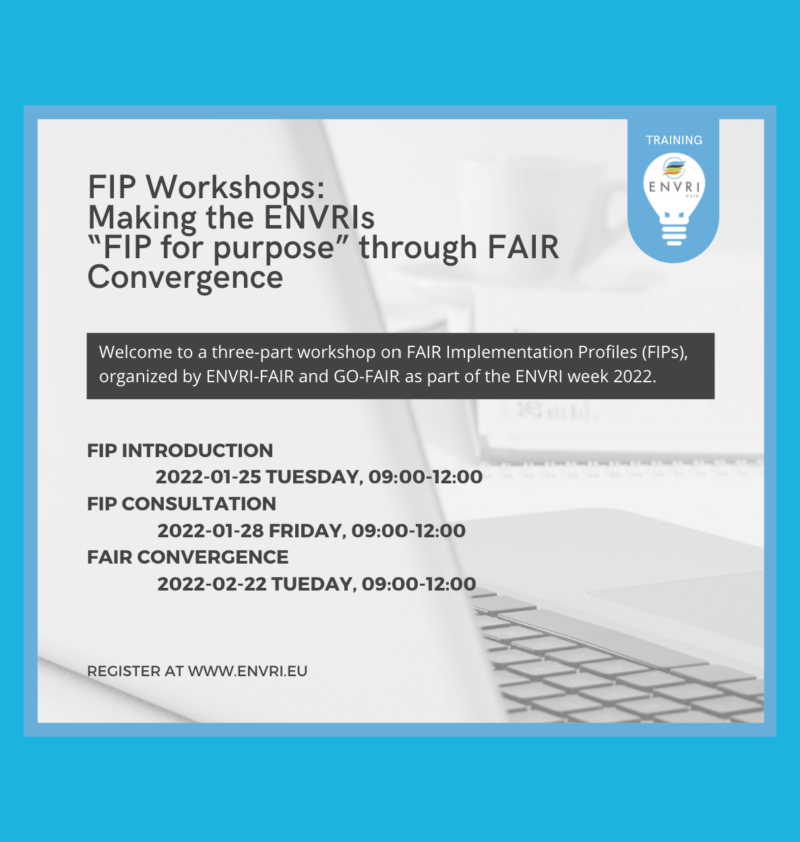ENVRI FIP workshops: Making the ENVRIs “FIP for purpose” through FAIR Convergence
Home | Events | Researchers | ENVRI FIP workshops: Making the ENVRIs “FIP for purpose” through FAIR Convergence

Online, 25 January – 22 February 2022.
For this series of workshops, ENVRI has invited experts in FAIR implementation to guide us through the steps needed to create our own FAIR Implementation Profiles (FIPs). The experts will provide an overview of the variety of options and technologies that are available to address each of the FAIR principles. Then, using state of the art tools, they will assist us in producing a set of machine-readable FAIR Implementation Profiles that support and inform FAIRification efforts both within, as well as between, ENVRI subdomain communities.
A link will be provided shortly before the meeting.
Registration
You have to register yourself to receive the meeting link. Please register here
Speakers
Barbara Magagna, Eric Schultes
Who should attend
Data management specialists and IT developers from all ENVRI Community members, across subdomains and RI maturity levels, who are working on FAIRifying their data management and services.
Background
The FAIR principles describe how digital objects should be like, and behave, for them to be Findable, Accessible, Interoperable and Reusable by computer-driven processes. But the principles do not give any detailed recommendations on how to achieve FAIRness in practice – what technologies to apply, which metadata standards to follow, etc. Instead, it is expected that every research community of practice should make their own choices. This has led to a huge variety of technical solutions for what are actually common problems.
To bring some order and convergence, and at the same time allow comparisons between and within domains, the concept of FAIR Implementation Profiles was introduced. These profiles are visualized in the FAIR Convergence Matrix, a collaborative online resource containing machine-readable descriptions of all FAIR implementation choices made by a wide range of research communities. This is the approach already taken by ENVIR-FAIR in the first two rounds of assessing the status of FAIR implementation in the involved RIs. Since then, the FIP tool has been considerably improved and this three-day training event will help to make use of it in the third run.
The FIP workshops in a nutshell:
FIP introduction
25 January 2022 – 9:00-12:00 CET
The first workshop introduces to the FIP approach: The FIP ontology and some discussion on the FAIR enabling resources (technical solutions, implementation strategies, standards and models) which address each of the FAIR Guiding principles. The FIP Wizard is explained and its use is demonstrated with the compilation of a demo example.
Based on this introduction, the data stewards in charge for each of the RIs’ are asked to engage the FIP Wizard and build the FIP representing the implementation choices of their specific repository.
FIP consultation
28 January 2022 – 9:00-12:00 CET
The second workshop provides consulting around the issues encountered by the data stewards, providing guidance around the many considerations influencing implementation choices.
FAIR convergence
22 February, 2022 – 9:00-12:00 CET
The finalised FIPs are collected in a FAIR Convergence Matrix where each column represents a Community (or a RI) and each row a FAIR enabling resource deployed for specific FAIR principles. In this way potential alignments of FIPs from different Communities can be identified in order to optimise convergence on the reuse of existing Resources and interoperation between the FAIR data and services of each Community.